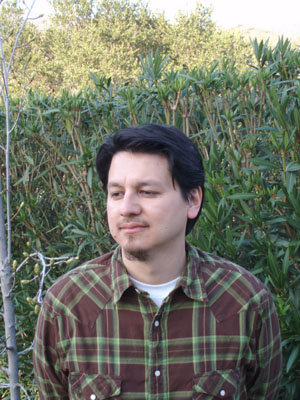Drinking
Beer in East L.A.
This is how he always wanted to remember himself:
leaning against the green Impala, something brown and juicy,
like Willie Bobo blowing out of the speakers,
sweat steaming down the eyebrows, his buddies
hanging out like lions in the heat, spread out over the hood,
watching the sun melt the asphalt,
the boulevard glowing with a line of low riders, puffing,
bouncing all the way down to the bald,
yellow mountains, where the outline of smog thickens
and the rickety houses wait for a can full of rain.
He would hook the bottle opener to the neck,
pop the cap off – a geyser of foam – a shot
for the lady tattooed on his back, his throat
ready for the long, cool rush of a false god.
Whitman
For evening walks in the city, I carry a book in my pocket
- dusty pages of bark set out in the sun.
The avenues run with the traffic grind, clang of cable cars
pulling downtown, smoke scattered everywhere.
The boy at the newsstand packs to go home; he’s dog-tired
from shouting all day into the air, “He was seen by the waters.”
Shoe-shine boy sitting next to him folds his newspaper
like a map, tells me, “It’s all true.”
From the moon-café, a piano rolls out into the street,
finger bones of a black man hover over the keys.
At the end of the street, atop the entrance of a black skyscraper,
a neon sign flickers in green: What is the grass?
On the stained walls of an alley, someone has painted
with long, red strokes, thick letters, “He was here.”
What if all this is true? Who is the old man with a white beard
sitting on the bench, smoking a cigar?
What if the mechanics, firemen, ferryboat pilots,
workers of the streets, all knew him?
On blue-cold streets, we meet strangers,
turn our eyes away into the smoke or passing cars.
We spend hours drawn out by the ticking clock,
living inside our skin, away from words raised in sunlight,
away from the tapping sound of heat, handful clap of dirt,
between curled fingers, a snap of leaves.
But I still see him, his echo deepening in the shade, leaves blue,
wet with rain. I hear him in the woman in rags,
she’s pushing a cart, butcher sharpening knives, farmer
picking grapes, his brown arched back rising like a tired sun.
You can’t tell me the immigrant reciting lines on the bus,
standing next to the driver, doesn’t have his voice of soil, roots.
Night stretches over rooftops. The machinery has stopped.
The multitude goes home, but it’s a silent walk.
On First Listening to Coltrane
I loved him, full-body wail of a tenor, large and round,
his crooked fingers on brass, choking the hollow horn
with God caught in his throat, the way he pushed
a mountain into his saxophone, it hit me
like a hundred iron wheels steamed down
the tracks, coal-driven, rolling solid
through the tongue of night, darker
than tar, grinding thoughts into sounds,
gush of phrases that spiral forward,
climb the tip of the wave about to uncurl,
spiral back, plunge and collapse
into this note, blessed and obsessed, perfect
in the palm of my hand, touched by the earth,
wet and small, dust and bones, the heavy weight of corn,
the wind that comes wrapped in fish and salt,
the cry of the crow high above the road
where he stands spindly as a tree,
the cymbal splash of sunlight, the horn blaring;
you’d think he’s cracking a branch
hooked in the river, green and growing, leaves carried
with the current, twirling, black and swollen,
bobbing along the line he plays,
plays again, until the branch finally snaps,
the driftwood swelling along the bank,
waves reflecting the bed of rock,
and then rain – the falling pins of rain –
the river that runs to the shore.
|

|
